2022 Census
Minister Simone Tebet participates in event to disseminate the results of the Census to the Indigenous population
August 09, 2023 10h00 AM | Last Updated: August 14, 2023 11h18 AM
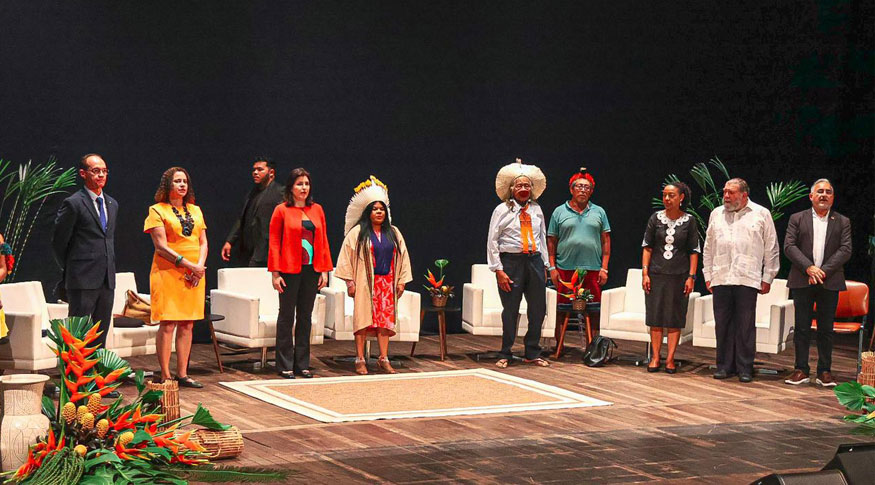 The first results of the 2022 Census for the Indigenous Population were released at an event at Theatro da Paz, in Belém - Photo: ASCOM MPI
The first results of the 2022 Census for the Indigenous Population were released at an event at Theatro da Paz, in Belém - Photo: ASCOM MPIThe IBGE presented in Belém, on Monday (7), the first results of the 2022 Population Census for the Indigenous Population. The venue chosen for the event was Theatro da Paz, which was filled with government officials, academics and iIdigenous leaders from across the country. Attending the ceremony were ministers Simone Tebet, of Planning and Budget, and Sônia Guajajara, of Indigenous Peoples. They were later joined by the Minister of Science, Technology and Innovation, Luciana Santos.
The reaminder is temporarily in Portuguese.
For the Census results on the Indigenous population, please click here.
The acting president of the IBGE, Cimar Azeredo, thanked the Minister of Planning, Simone Tebet, and the Minister of Indigenous Peoples of Brazil, Sonia Guajajara, who were present at the press conference held before the results release event. He commented on the close partnership with the Institute since the beginning of the present administration, aiming at completing the census collection on Indigenous lands. "The consortium that you helped us set up together with the Federal Highway Police, the Ministry of Justice and the Ministry of Defense so that we could guarantee the Indigenous Census in the Yanomami and Waijãpi lands was fundamental so that today we could present the most comprehensive picture of the Indigenous population ever," he said.
Mr. Azeredo emphasized that the current number of Indigenous residents in Brazil is 1,693,535, while in 2010 it was 896,917. "That's why doing the Census is rediscovering Brazil," he said. And he overtly thanked the Indigenous associations that actively helped complete this Census.
 Opening ceremony of the event to disseminate the first results of the 2022 Census for the Indigenous Population, at Theatro da Paz - Photo: ASCOM MPI
Opening ceremony of the event to disseminate the first results of the 2022 Census for the Indigenous Population, at Theatro da Paz - Photo: ASCOM MPI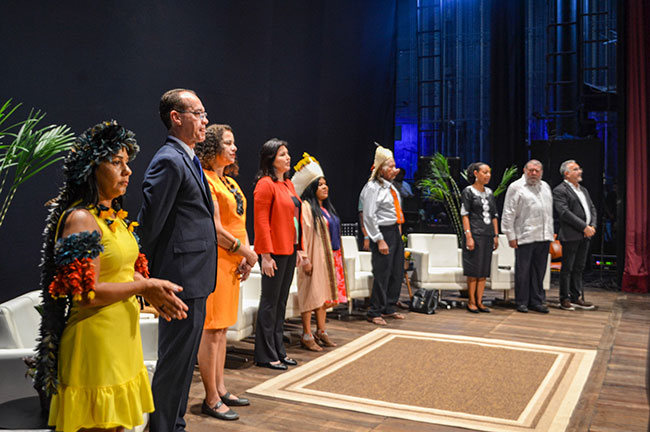 Authorities lined up on stage for the Brazilian National Anthem - Photo: IBGE collection
Authorities lined up on stage for the Brazilian National Anthem - Photo: IBGE collection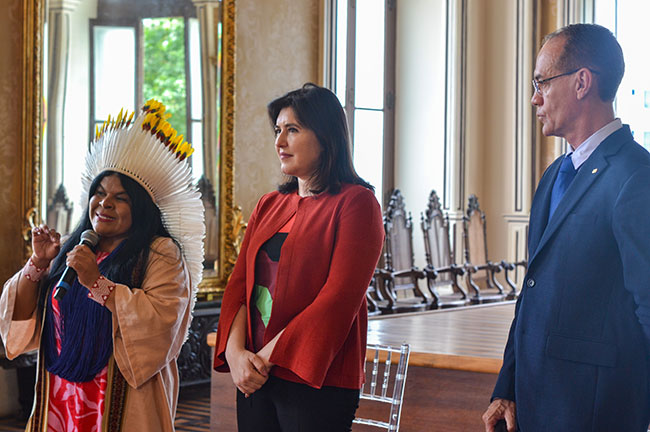 In a press conference before the event, ministers Sonia Guajajara (Indigenous Peoples) and Simone Tebet (Planning and Budget) commented on the Census alongside the acting president of the IBGE, Cimar Azeredo - Photo: IBGE collection
In a press conference before the event, ministers Sonia Guajajara (Indigenous Peoples) and Simone Tebet (Planning and Budget) commented on the Census alongside the acting president of the IBGE, Cimar Azeredo - Photo: IBGE collection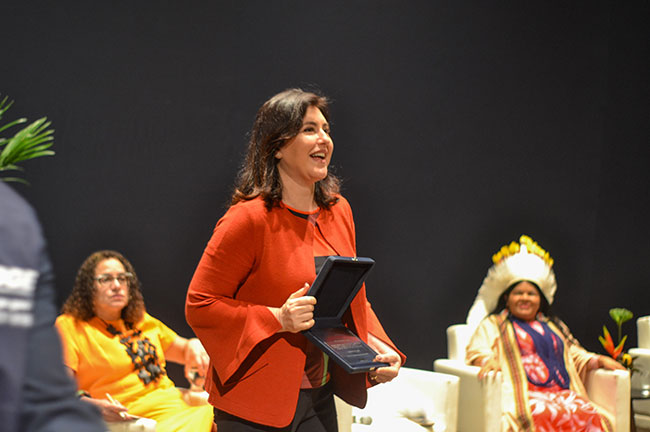 Ahead of the Ministry to which the IBGE is subordinate, Minister Simone Tebet received a commemorative plaque for the support given to the 2022 Census - Photo: IBGE Collection
Ahead of the Ministry to which the IBGE is subordinate, Minister Simone Tebet received a commemorative plaque for the support given to the 2022 Census - Photo: IBGE Collection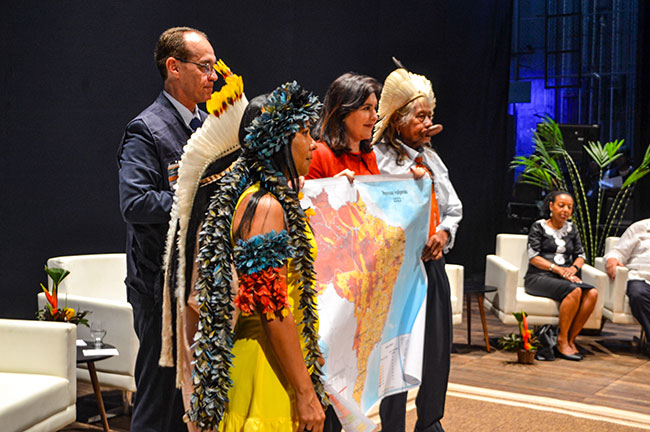 New map of areas with resident Indigenous population is presented to the country - Photo: ASCOM MPI
New map of areas with resident Indigenous population is presented to the country - Photo: ASCOM MPI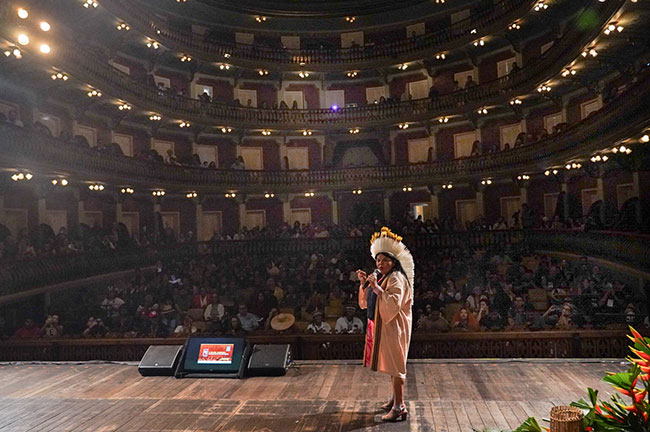
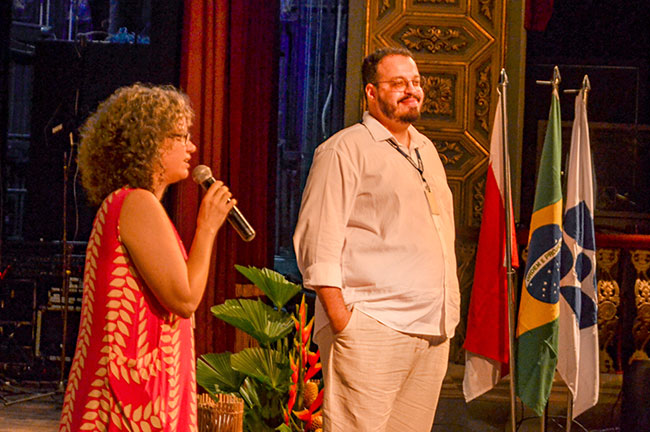 Census methodology and numbers were detailed by Marta Antunes, responsible for the IBGE's Traditional Peoples and Communities Project, and Fernando Damasco, manager of Traditional Territories and Protected Areas at the IBGE - Photo: IBGE collection
Census methodology and numbers were detailed by Marta Antunes, responsible for the IBGE's Traditional Peoples and Communities Project, and Fernando Damasco, manager of Traditional Territories and Protected Areas at the IBGE - Photo: IBGE collection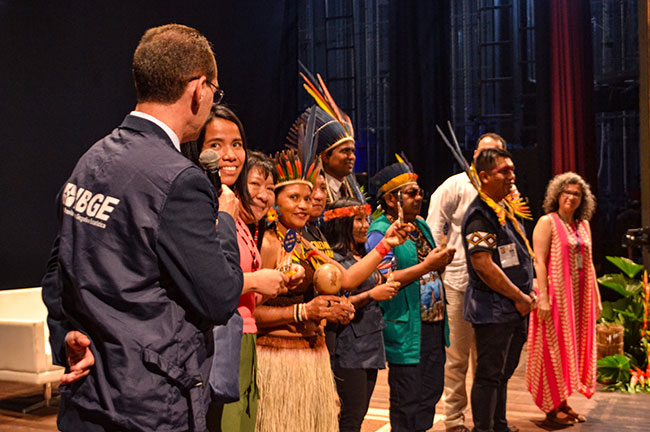 On behalf of the IBGE, Cimar Azeredo honored on stage the Indigenous enumerators, guides and interpreters who worked on the 2022 Census - Photo: IBGE Collection
On behalf of the IBGE, Cimar Azeredo honored on stage the Indigenous enumerators, guides and interpreters who worked on the 2022 Census - Photo: IBGE Collection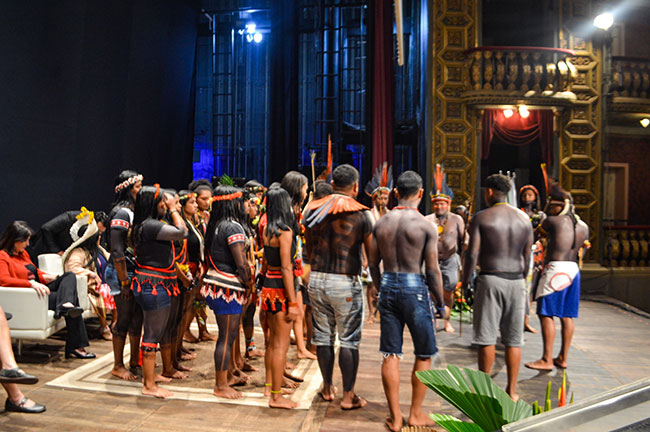 Group of young Tembé performing songs and dancing on stage at Theatro da Paz - Photo: IBGE collection
Group of young Tembé performing songs and dancing on stage at Theatro da Paz - Photo: IBGE collection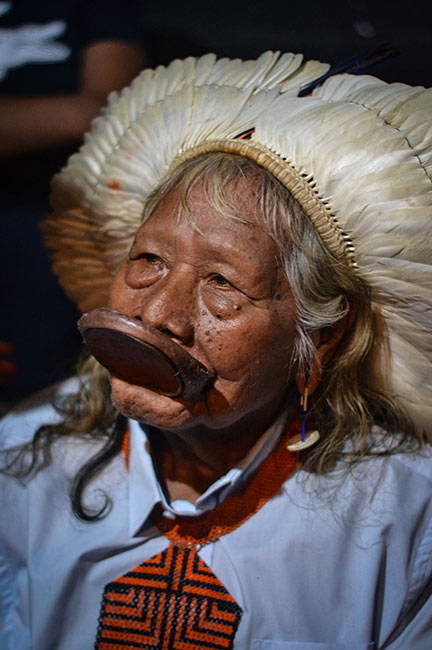 Chief Raoni, of Kayapo origin, gave a speech in his mother tongue - Photo: IBGE collection
Chief Raoni, of Kayapo origin, gave a speech in his mother tongue - Photo: IBGE collectionMinister Sonia Guajajara said she was witnessing a historic moment in the resumption of the protagonism of indigenous peoples. "After 13 years, we have updated data on the Indigenous population", she said, adding that this "facilitates the elaboration of adequate public policies for each of the realities where Indigenous peoples are present".
Ahead of the Ministry to which the IBGE is subordinate, Minister Simone Tebet stressed that the mapping carried out by the Institute was efficient because it had a team of enumerators, supervisors and coordinators who love what they do. Later, in a speech on the theater stage, Ms. Tebet reinforced the honorable mention for the IBGE servants. "We trust the credibility, competence, accuracy and love that the IBGE and its servants have for Brazil".
Among the Indigenous leaders present at the ceremony was chief Raoni, internationally known for his fight on behalf of the Amazon and the Indigenous Peoples. He made a statement in his mother tongue (Kayapo), which was then translated. Raoni warned against deforestation in Indigenous lands and asked everyone to join efforts for the preservation of the environment.
In the second part of the event, representatives of Census partner institutions together with Indigenous peoples went up the stage. The president of Funai, Joenia Wapichana; the state secretary of Indigenous Peoples of Pará, Puyr Tembé; the Indigenous Health Secretary of Sesai (Special Secretariat for Indigenous Health), Weibe Tapeba; the representative of the Federation of Indigenous Peoples of Pará, Ronaldo Amanayé; the representative of the Articulation of the Indigenous Peoples of Brazil (Apib), Cleber Karipun; and the administrator of the Indigenous Association Gavião Kyikateje of the Indigenous Federation, Concita Sõpré. Before the speeches, the Indigenous interpreters, guides and servants from the IBGE who participated in the collection in Indigenous lands throughout the country were awarded commemorative plaques, to the audience's applause.
The event also featured a singing and dancing performance by the Tembé youth group, and a cultural performance by poet Marcia Vieira da Silva, from the Kambeba ethnic group. The closing of the ceremony culminated with the detailed disclosure of the numbers and methodology used in the data collection of the Indigenous population. The detailing of the data and concepts used in the survey was carried out by Marta Antunes, responsible for the project on Traditional Peoples and Communities at the IBGE, and Fernando Damasco, manager of Traditional Territories and Protected Areas at the IBGE.
Check out what event participants had to say
"We trust the credibility, competence, correctness and love that the IBGE and its employees have for Brazil".
Simone Tebet, Minister of Planning and Budget
"After 13 years, we have updated data on the indigenous population. This facilitates the creation of adequate public policies for each of the realities where Indigenous peoples are present".
Sonia Guajajara, Minister of Indigenous Peoples
"The best of our intelligence, of the Brazilian universities and of the original peoples has to be at the service of the quality of life of the peoples of the Amazon."
Luciana Santos, Minister of Science, Technology and Innovation
"We need to join effrots to protect what we have left of natural resources and forests. Otherwise, we will have serious problems. This issue has to be everyone's business."
Cacique Raoni, indigenous leader
"We have seen from one Census to another strategic changes which are fundamental for us to outline plans, programs and actions in terms of economic and social policies. And the IBGE brings us these answers."
Joenia Wapichana, President of Funai
"I stress the need to have the Indigenous population counted, since the IBGE data are the basis for planning and resource allocation for our peoples."
Weibe Tapeba, Indigenous Health Secretary of the Special Secretariat for Indigenous Health (Sesai)
"Data bring us the new reality of the Indigenous Peoples of Brazil and show us how challenging it will be to design public policies for all of us."
Puyr Tembé, State Secretary for Indigenous Peoples of Pará
"We hope that the set of basic information on the total Indigenous population in Brazil provide the necessary ground for greater visibility, making these peoples more participatory in the economic, social and sustainable development of this country."
Florbela Fernandes, UNFPA representative
"We see that not only has vegetative growth increased, but also Indigenous pride. And this brings us great joy."
Edmilson Rodrigues, mayor of Belem
"We knew we were many, we knew we were more than white men's statistics showed. I want to thank the IBGE for bringing up this reality."
Concita Sõpré, administrator of the Indigenous Federation




















